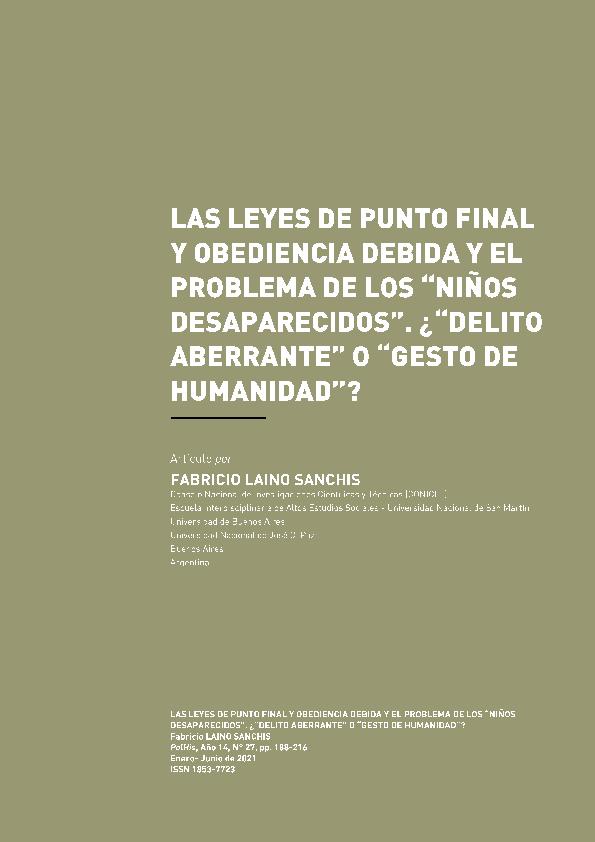Mostrar el registro sencillo del ítem
dc.contributor.author
Laino Sanchís, Fabricio Andrés

dc.date.available
2022-08-30T17:24:17Z
dc.date.issued
2021-12
dc.identifier.citation
Laino Sanchís, Fabricio Andrés; Las leyes de Punto Final y Obediencia Debida y el problema de los "niños desaparecidos": ¿"Delito aberrante" o "gesto de humanidad"?; Programa Interuniversitario de Historia Política; PolHis; 14; 27; 12-2021; 188-216
dc.identifier.issn
1853-7723
dc.identifier.uri
http://hdl.handle.net/11336/166958
dc.description.abstract
Las leyes de "Punto Final" (1986) y "Obediencia Debida" (1987) fueron los instrumentos con los que el gobierno de Raúl Alfonsín buscó clausurar el tratamiento judicial de los crímenes cometidos por las Fuerzas Armadas y de Seguridad durante la última dictadura en Argentina (1976-1983). Sin embargo, ambas leyes excluyeron de los beneficios de la extinción de la acción penal a la apropiación de niños y niñas ¿Por qué se produjo esta exclusión? ¿Qué lugar ocupó este delito en el debate de las leyes? A partir de estas preguntas, en este artículo analizamos ambos debates parlamentarios e indagamos en los argumentos políticos, legales y jurídicos utilizados para justificar o rechazar dicha exclusión. Analizamos también las representaciones sobre la cuestión de los "niños desaparecidos" que estas intervenciones pusieron de manifiesto. Al complementarlo con las diferentes reacciones públicas de Abuelas de Plaza de Mayo, este análisis nos mostrará también el repertorio de interacciones posibles entre los organismos de derechos humanos y el poder político en la temprana posdictadura.
dc.description.abstract
The Full Stop (1986) and the Due Obedience (1987) Acts were the instruments with which the Raúl Alfonsín administration sought to close the discussion of the crimes committed by the Armed and Security Forces during the last dictatorship in Argentina (1976‑1983). However, both acts excluded the crime of children appropriation from the benefits of applying the statutes of limitation. Why did this exclusion occur? What was the role of this crime in the discussion of these acts? This article analyzes parliamentary debates and explores the political and legal grounds used to justify or reject such exclusion. It also deals with the representations on the issue of the “niños desaparecidos” (“disappeared children”) that these interventions revealed. Complemented with the different public reactions of the Grandmothers of the Plaza de Mayo, this paper also shows the repertoire of interactions between human rights organizations and the political power in the early post-dictatorship period.
dc.format
application/pdf
dc.language.iso
spa
dc.publisher
Programa Interuniversitario de Historia Política
dc.rights
info:eu-repo/semantics/openAccess
dc.rights.uri
https://creativecommons.org/licenses/by-nc/2.5/ar/
dc.subject
Abuelas de Plaza de Mayo
dc.subject
Apropiación de niños y niñas
dc.subject
Leyes de Punto Final y Obediencia Debida
dc.subject
Debates parlamentarios
dc.subject.classification
Historia

dc.subject.classification
Historia y Arqueología

dc.subject.classification
HUMANIDADES

dc.title
Las leyes de Punto Final y Obediencia Debida y el problema de los "niños desaparecidos": ¿"Delito aberrante" o "gesto de humanidad"?
dc.title
The Full Stop and the Due Obedience acts and the issue of the “disappeared children”: An “aberrant crime” or a “gesture of humanity”?
dc.type
info:eu-repo/semantics/article
dc.type
info:ar-repo/semantics/artículo
dc.type
info:eu-repo/semantics/publishedVersion
dc.date.updated
2022-08-29T13:45:27Z
dc.journal.volume
14
dc.journal.number
27
dc.journal.pagination
188-216
dc.journal.pais
Argentina

dc.journal.ciudad
Mar del Plata
dc.description.fil
Fil: Laino Sanchís, Fabricio Andrés. Consejo Nacional de Investigaciones Científicas y Técnicas; Argentina. Universidad Nacional de Jose Clemente Paz; Argentina. Universidad Nacional de San Martín. Instituto de Altos Estudios Sociales; Argentina. Universidad de Buenos Aires. Facultad de Ciencias Sociales. Instituto de Investigaciones "Gino Germani"; Argentina
dc.journal.title
PolHis
dc.relation.alternativeid
info:eu-repo/semantics/altIdentifier/url/http://www.polhis.com.ar/index.php/polhis/article/view/342
Archivos asociados
